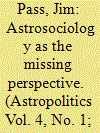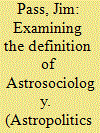| Srl | Item |
| 1 |
ID:
072006


|
|
|
|
|
| Publication |
2006.
|
| Summary/Abstract |
Astrosociology represents a distinctive emergent field within the sociological discipline and outside of it, inclusive of the other social sciences and a strong connection to the natural sciences. It provides a heretofore absent focus that partly serves to complement the work of space scientists and engineers, including the space policy issues that guide the direction of their work. By adopting astrosociology, this missing perspective increases the current scope of attention by adding its focus on the societal implications of human developments related to space generally and space exploration specifically. This relationship between space and society, viewed in both causal directions, influences social change within any particular society and possesses implications for future projects and missions. Astrosociology adds a sociocultural dimension to the conventional approach of space sciences that currently devalues a social science orientation. With the addition of astrosociology, practitioners of space will become exposed to decision-making criteria normally unavailable to them under current circumstances.
|
|
|
|
|
|
|
|
|
|
|
|
|
|
|
|
| 2 |
ID:
103925


|
|
|
|
|
| Publication |
2011.
|
| Summary/Abstract |
A void has existed within the social sciences for over fifty years since the launch of the first Sputnik satellite in October 1957. This void delineates the boundaries of a missing field, a discipline capable of focusing on the relationship between social life and outer space. It is true that social scientists have pursued space issues over the last thirty years or so. As individuals, they have participated in the areas of search for extraterrestrial intelligence research, astrobiology, space policy, and space history. The strength of astrosociology, however, lies in its formalization of this type of approach into an identifiable field of study, which allows for a more organized and inclusive opportunity for participation. As a starting point, one may express the relationship between social life and outer space as astrosociology. One can define astrosociology as the study of social, cultural, and behavioral patterns related to outer space. The purpose of this article is to provide a general framework for more precise language concerning the definition, scope, character, and future development of astrosociology, while simultaneously attempting to elicit a broader discussion of astrosociology's association to other disciplines. It suggests how the various fields and disciplines associated with astrosociology as a multidisciplinary field can work together to build a missing body of knowledge from their related literatures and contemporary research.
|
|
|
|
|
|
|
|
|
|
|
|
|
|
|
|